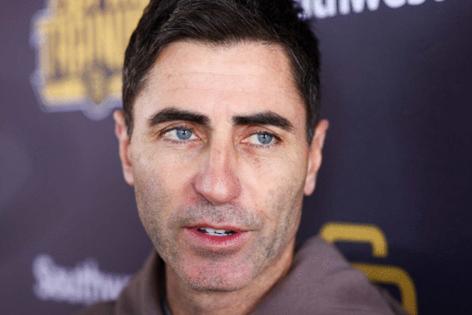Tom Krasovic: Early faith in A.J. Preller continues to pay off for Padres
Published in Baseball
SAN DIEGO — The summer wind was on the verge of blowing into Chicago, yet as Bruce Bochy walked in the city following yet another defeat, the young Padres manager talked as though one of Lake Michigan’s notorious winter gusts — the Hawk — might soon tear into him.
Ambling the streets that June night in 1996, Bochy quipped that if his team didn’t soon pull out of its tailspin, Larry Lucchino, the team’s president, would be all too happy to fire him.
Bochy may not have been jesting entirely. At Wrigley Field that afternoon, his Padres were beaten for the 10th time in 11 games. And Bochy, by not being Lucchino’s “guy,” had reason to wonder, absent an imminent turnaround, if he would weather this freefall.
Lucchino had inherited Bochy after joining the Padres as the sidekick to incoming team owner John Moores. Bochy’s first season, in 1995, was only so-so. MLB’s labor strike that year afforded him a mulligan. He wouldn’t get a second one. The Padres had to win. Moores and Lucchino sought public funding for a downtown ballpark. Playoff contention was required.
The 1996 Padres pulled out of their June swoon, although not before they fell into last place with their 19th loss in 23 games. They went on to win just the second divisional title by a Padres club.
Bochy, for his part, was just warming up.
He became one of baseball’s top managers — ever.
Leadership’s well-informed patience with Bochy reaped enormous rewards two years later, when the Padres helped get Petco Park built by winning the 1998 National League pennant. Later, Bochy guided the Giants to their only three World Series titles in San Francisco and the Texas Rangers to their only World Series crown since they began play in 1972.
Many years later, a similar Padres scenario has played out. Only this time, it was A.J. Preller, the team’s top talent man, on the hot seat.
Had Preller been fired early in his tenure as Padres general manager, it would’ve been unsurprising by MLB standards — and it would’ve been a big mistake, almost certainly.
Hired in August 2014, the rookie GM had a first offseason that was long on gusto. But it was so short on wisdom, I would come to wonder if Preller was cut out for a GM gig.
He traded two prospects he inherited, Trea Turner and Max Fried, in separate deals. Both would become big league stars who helped their teams win World Series titles.
Committing a Padres felony in that same debut offseason, the rookie GM made a bad trade with the Dodgers. And he overpaid pitcher James Shields by a lot, a deal that also cost the Padres a top-15 draft pick.
Preller survived. That’s because the bosses who’d hired him, Peter Seidler, Ron Fowler and Mike Dee, who were in the midst of their own steep learning curve, believed he would lead the franchise to sustained playoff contention.
There would be more turbulence: Major League Baseball suspended Preller in September 2016, two years into his tenure, after it determined he failed to disclose required medical information in a trade.
Preller kept his job. Not all GMs would have.
But Preller, rewarding ownership’s faith, outgrew his Dennis the Menace phase.
His Padres haven’t won any pennants, true. But unless this year’s team falls apart in stunning fashion, the Padres will this year secure the club’s fourth postseason berth in six years — the franchise’s best run of relevance.
Like with Bochy, a lot of MLB folks underestimated Preller.
It’s laughable to revisit some of the comments scouts or executives from other MLB teams made after Preller’s suspension nine years ago.
They said GMs would become reluctant to trade with Preller.
Yeah, right. Preller has become the highest volume blockbuster trader of this era.
Deeper into the GM’s tenure, other teams often raised another false notion — that Preller had dealt so many prospects, the farm system would stink for several years, hindering his ability to continue to trade prospects for big leaguers.
Instead, after nearly trading more minor leaguers during the pandemic-shortened 2020 season than the whole league did, Preller backed up the farm truck again in 2022, 2024 and now 2025. In return, he got a bunch of big leaguers.
The GM and his scouts sustained their success in the amateur markets, drafting players and signing teens out of Latin America that other teams would seek in trades. Believing that the first job of the farm system is to improve the big league team, Preller became extra comfortable with trading with a wide variety of teams.
For the most part, dating to the 2020-21 offseason, he has done a good job of it.
Preller has created a rare niche in MLB. That’s difficult. And he has owned it. That’s even harder.
Though the Dodgers can outspend them, Preller and his scouts have, in effect, created their own extraordinary level of currency. They’re able to regenerate loads of trade value and use it to improve the big league team. It’s why they now have a chance of challenging the Dodgers for the National League West title and a possible first-round playoff bye.
A Bochy outcome here — an extraordinary World Series title — isn’t probable.
But it is possible. And it began with bosses allowing a young leader to get his footing.
©2025 The San Diego Union-Tribune. Visit sandiegouniontribune.com. Distributed by Tribune Content Agency, LLC.







Comments